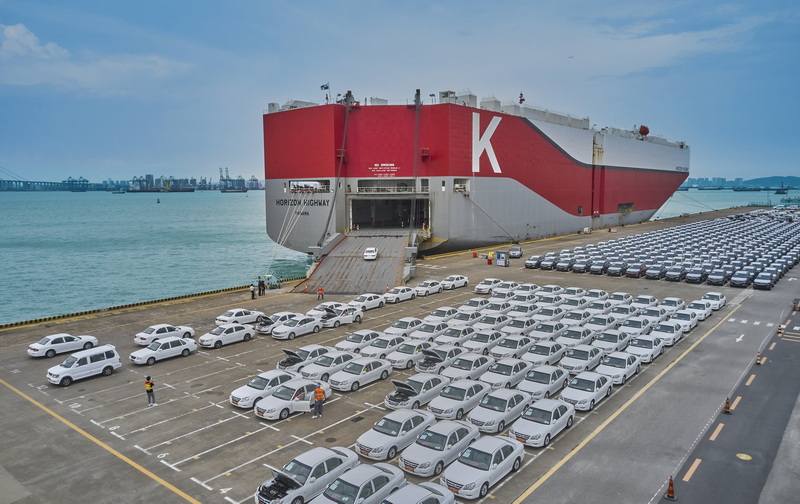Ethiopia needs affordable transportations options. Ethiopia’s car market has always been unpredictable, with used cars dominating for many years. China in this regard seems to be the best option in terms of affordability.
High import taxes, combined with economic difficulties, have created significant obstacles for many individuals seeking to purchase new cars. Moreover, both new and used car sales have experienced a considerable uptick, as reported by Mordor Intel.
- One of the hurdles stalling market growth has been the imposition of exorbitant import taxes.
- Taxes have elevated new cars to a status of luxury, placing them beyond the financial grasp of many prospective buyers.
- Finding spare parts and reliable after-sales service has been a significant challenge for keeping cars running smoothly.
Despite facing various obstacles, Chinese car manufacturers have successfully captured the interest and purchasing power of Ethiopian consumers.
Renowned brands such as BYD, Chery, and Geely have cemented their presence by offering affordable yet feature-packed models.
Notably, vehicles like the BYD F3 and Geely Emgrand are gaining traction, owing to their attractive blend of cost-effectiveness and dependability.

Chinese Automobile Market in Ethiopia
The Ethiopian government has implemented appropriate trade liberalization policies OR Chinese car import regulations in Ethiopia in order to encourage Investor flights and low cost new vehicles. Some of these are the reduction of import duties on new and used vehicles, especially new cars, as well as offering fiscal incentives such as tax credits for the purchase of EVs.
The current government of Ethiopia recently liberalized the rules for import of EV parts with no duties to encourage the use of green transport. This policy change seeks to make a new generation of vehicles, particularly electrically powered models more accessible to the Ethiopian customer.
Several factors have contributed to the increased importation of Chinese cars to Ethiopia, these factors entail; shifts in trade relations, changes in policies concerning trade, investment by the Chinese automobile companies, and changing market demands for affordable and differentiated car models.
Why buy Chinese cars in Ethiopia
- Affordability: The Chinese cars also cost relatively lower than the Japanese, American or the European cars and hence are affordable to more people. This cost is quite appealing to the Ethiopian customers who desire cheaper transport means and services.
- Advanced Features: While most Chinese cars are cheaper compared to the likes of Toyota, they also contain modern trappings that will attract informed consumers. Such aspects include safety, entertainment, and powertrain management in a manner that makes them offer a good package in the market.
- Improved Quality and Perception: Quality of cars manufactured by Chinese automakers has enhanced greatly and social and economic issues earlier felt regarding reliability and durability are less of a concern now. Some of the brands that are currently dominating the market include BYD, Chery, and Geely; these car makers have over time greatly improved the quality of their cars and thus placed confidence with the Ethiopian consumers.
Chinese cars offer an appealing alternative in Ethiopia’s diverse and evolving market, as European luxury sedans struggle to cater to the masses.

What Chinese car brands are in Ethiopia?
Ethiopian consumers have been a target of Chinese car manufacturers in particular due to the following reasons. Some car makers of this caliber include BYD, Chery and Geely set models that are not only affordable but contain most of the gimmicks.
- BYD: With electric and plug-in hybrid automobiles, BYD has been steadily increasing its market share in Ethiopia with some of its models including BYD F3 and BYD Tang which are widely known for their affordable prices and new generation features.
- Chery: This is a state owned automobile manufacturing company which deals with production of various models of cars mainly/passenger cars and SUVs. These include models like the Chery Tiggo and other cars have started to make their way into the Ethiopian market because they are very reliable and the cost of maintaining them is very cheap.
- Geely: Companies like Geely, the owner of Volvo and Lotus, set heart into their affordable automobiles yet equipped with numerous functions. New generation vehicles are some of the Automobiles that have flooded the Ethiopian market and some of the popular models include the Geely Emgrand.
These brands are not only emerging to compete regarding the prices they offer but also because the middle-income earners of Ethiopians are also considered to get value for the quality and features offered on these brands. Furthermore, the Ethiopian government has set policies that require people or companies to use more fuel-efficient cars, and this is something that falls squarely within the domains of those Chinese car makers.
What is the best selling car in Ethiopia?
Recently, Toyota Hilux is ranked among the most Popular Chinese-made car models in Ethiopia. The Toyota hilux has been known in the market as a very popular model mainly because of factors such as durability, reliability and versatility that the car gains from due to its usability in both urban and rural areas.

Due to the strength of the material that has been used in its construction and the ability of getting spare parts in most places in the country, people tend to like it. It is widely employed in such segments owing to its versatility, such as agriculture, construction, government and NGOs use and purchase, and other segments.
Another highly popular model at the moment is the Toyota Corolla. Specifically, the ninth generation Corolla and other generations such as the tenth, eleventh generations of the car (models 2000-present) are some of the most frequently spotted vehicles in Ethiopia.
They are preferred because of their efficiency and affordable prices and as a result, many of them are noticed on the Ethiopian roads as mentioned in “All About Ethiopia”.
Local Chinese manufacturers are also penetrating the market with the likes of BYD and Chery, with the BYD F3 and Chery Tiggo now fairly common owing to their affordability and compared to other cars in their class can be considered quite contemporary.
Cost of Chinese cars in Ethiopia
The cost of Chinese cars in Ethiopia can vary significantly depending on the make, model, and features of the vehicle. Here’s an overview of some common Chinese car brands and their prices in Ethiopia:
- BYD Yuan Up Single Motor: Approximately 750,400 ETB.
- BYD Yangwang U7 (2024): Approximately 7,840,000 ETB.
- Geely Panda Knight Luxury: Approximately 616,000 ETB.
- Dongfeng Nammi 01 EV: Approximately 582,400 ETB.
- MG Cyberster 100th Anniversary Edition: Approximately 3,904,880 ETB.
These prices illustrate the range from more affordable models like the Geely Panda to more high-end options like the BYD Yangwang U7.
Electric cars, which are becoming increasingly popular in Ethiopia due to government incentives and tax exemptions, can range from around 500,000 ETB to over 2,000,000 ETB for various models.
This shift towards electric vehicles is part of Ethiopia’s broader strategy to adopt eco-friendly transportation solutions.
Future of Chinese cars in Ethiopia
The Ethiopian government has set a bold target to deploy nearly 500,000 electric vehicles (EVs) over the next decade, significantly advancing its shift towards sustainable transportation.
Initially, the plan includes importing around 148,000 electric vehicles and 48,555 electric buses.
This ambitious strategy is part of a broader ten-year plan, which is expected to be achieved well ahead of schedule, prompting the government to revise its target to 439,000 EVs by 2030.
● Government Incentives
To encourage this change the Ethiopian government has enforced the following incentives; These are; importation of parts for assembly, free taxes, a 5% tax on parts that are partially assembled EVs and a 15% tax on fully assembled EVs. These incentives are intended to make electric vehicles more attractive than gasoline vehicles because the latter attracts high import taxes.

● Economic and Environmental Benefits
Minister of State for Transport and Logistics, Barreo Hasen, pointed out the position of economics in considering this change, relying on the fact that it will save large amounts of foreign currency, which Yemen spends on importing fuel. The Ethiopian government alone consumed about $6 billion for fuel in the year 2023 out of which over fifty percent was utilized for fuel-powered automobiles. Moreover, the change in the vehicle type to those that are electric has the potential of decreasing pollution within urban areas tremendously.
● Private Sector Involvement
The government’s push for EVs has also spurred private sector engagement. Companies like Belayneh Kindie Metal Engineering Complex are now assembling electric mini buses locally, using components imported from China. For instance, China’s King Long supplies parts for electric mini buses and larger buses, catering to Ethiopia’s growing demand for EVs.
Besufekad Shewaye, general manager of Belayneh Kindie Metal Engineering Complex, said in an interview that Ethiopia’s rich hydropower resources provide a solid foundation for the country’s electric vehicle market. Starting from mid 2023, the company has commissioned and fed 216 electric mini buses into the Ethiopian market and has marketed half of these products to the transportation service providers and government agents.
These developments show potential to grow the automotive industry in Ethiopia in the next coming years with due emphasis on electric vehicles in order to reduce fuel importation and environmental degrading effects.


